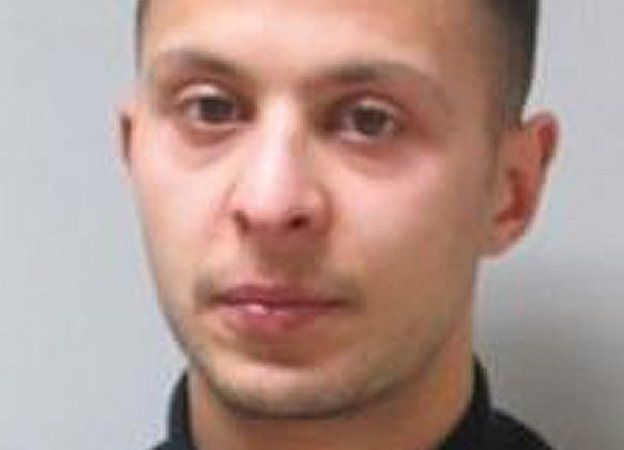Paris attacks: The Belgian brothers linked to terror in France
- Published

The sign on the door of Les Beguines, a corner cafe and bar in the rundown Brussels district of Molenbeek, said the place had been closed down because of suspected drug dealing on the premises.
Once a busy nightspot well known to locals - and local authorities - the bar now sits shuttered and silent. Two weeks after it closed its doors, owner Brahim Abdeslam detonated a suicide vest outside another busy corner cafe, this one in Paris.
At least 129 people were killed in the attacks carried out by Abdeslam and his accomplices, and more than 350 injured. At the Bataclan concert hall, where 89 people were shot dead, the killers said they were taking revenge for French air strikes in Syria.
But the alcohol behind the bar at Les Beguines, and the cannabis allegedly peddled around it - both prohibited by Islam - seem strangely at odds with the apparent religious fanaticism of its owner, and manager.
The manager was Brahim's younger brother Salah, a suspect in Friday's attacks and now the subject of a manhunt. A third brother, Mohamed, has been arrested, released, suspended from his job with the local council and forced to deny he is a terrorist.
The Abdeslam brothers were well known in Molenbeek, one of the poorest parts of Belgium and home to a large Muslim community. The district is also home to a large number of foreign fighters who have travelled to Syria and returned.
Brahim and Salah had several business interests in the town, including the bar and a grocery shop. The council ruled recently that the family income was too high for them to remain in their social housing, local officials told the BBC. Brahim went to the council and broke the door of the housing officer, and had to be restrained.
But the brothers did not seem like fanatics, customers and neighbours said. They enjoyed drinking and smoking, and good clothes.
"He was not really an Islamist type of guy," Sheraz Sheik, a neighbour, told reporters of Salah. "He was always well dressed with designer clothes and no beard. A really smart guy, really intelligent."
Even police ruled after questioning them that the brothers did not pose a risk, according to Belgium's federal prosecutor Eric Van Der Sypt.
"We knew they were radicalised and might visit Syria but they showed no sign of a possible threat," Mr Van Der Sypt said.
Like Salah, Brahim - also known as Ibrahim - was known in the town for living a carefree lifestyle, but he had recently stopped drinking alcohol, said a regular at the bar.
"Ibrahim and I played cards together, we laughed and joked," the man, who did not want to be named, told the Daily Telegraph. "He talked to everyone, he was very generous. I would have a drink and he would say don't worry about paying.
"I used to play cards with Salah too, he was often at the cafe. Ibrahim used to go to discos, he would drink alcohol, smoke. But he stopped drinking alcohol in the last year."
About 30% of Molenbeek's 100,000 residents are foreign nationals and more than 40% have foreign roots, including a large ethnic Moroccan population. More than a quarter are unemployed - a high number of them among the young.
Unemployment together with poverty, social exclusion, and weak political leadership have contributed to turning Molenbeek into a "breeding ground for radical violence" - the words of its own mayor.
Some of Molenbeek's immigrants barely leave the streets they live in, a local councillor told the BBC, hampering integration. Local authorities are concerned about mosques and prayer rooms controlled by radical preachers, but there is little funding to tackle them, the councillor said.
Molenbeek has been tied to several recent terror plots. It was searched in January during anti-terror operations carried out in the wake of the Charlie Hebdo attacks in Paris, and in August the suspect in a thwarted attack on a high-speed train from Belgium to France was reported to have stayed in the area.
A Frenchman accused of shooting dead four people at the Jewish Museum in Brussels in May 2014 was also reported to have spent time in the neighbourhood. As a result, the district has been painted as a haven for jihadists, a portrayal which has angered some of its residents.
"People shouldn't think this place is a bad place, or a dangerous place," Bleri Lleshi, a Belgian writer and local, told the BBC's Have Your Say programme. "On the contrary, this place is a great place."
Mohamed Abdeslam, brother of suspects: "I was not involved in any way"
The Abdeslam family home sits opposite Molenbeek town hall in a quiet cobbled square. It was here that Mohamed Abdeslam, the third brother, spoke to reporters after his release.
"We've never had problems with the law," he said. "You must understand that, despite this tragedy, my parents are in shock and haven't quite yet realised what happened."
Speaking to a reporter through her nephew, Mohamed's mother said Brahim "did not mean to kill anyone", adding that he may have blown himself up because of stress.
The family were "thinking of the victims and the families of the victims," Mohamed said. "But you must understand, we have a mother, we have a family, and he is still her son."